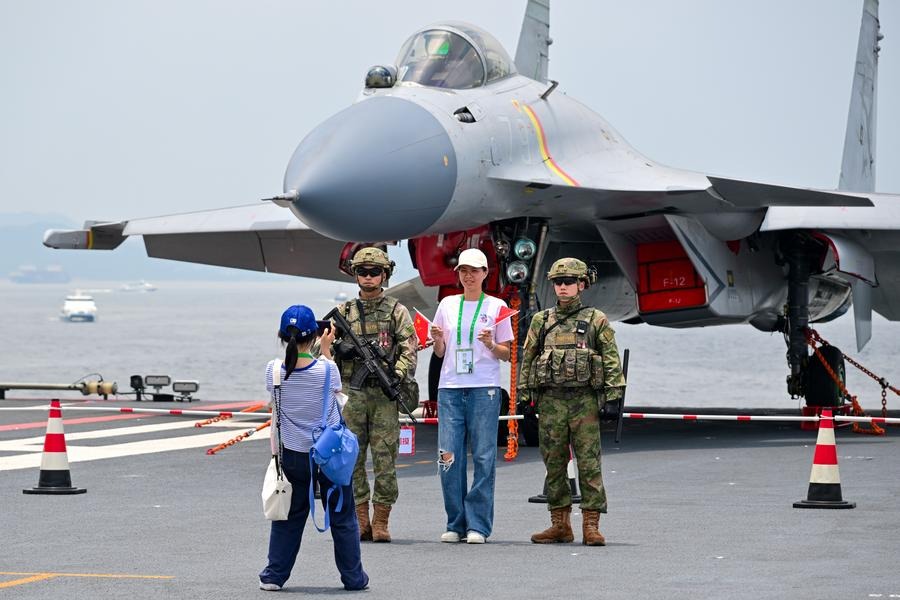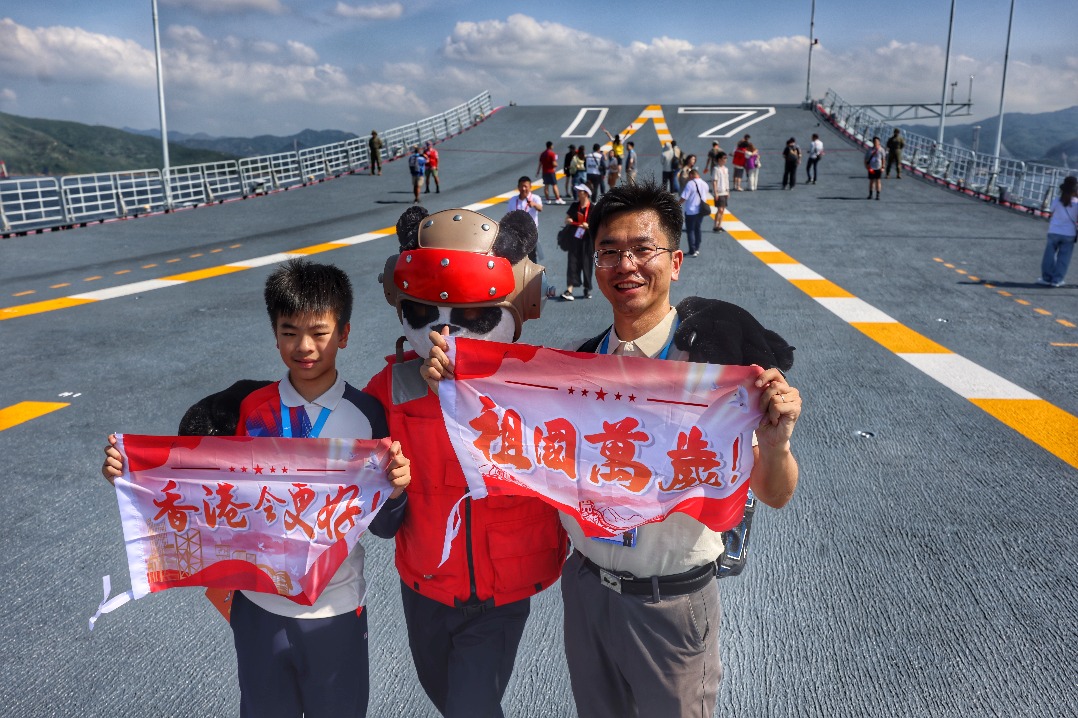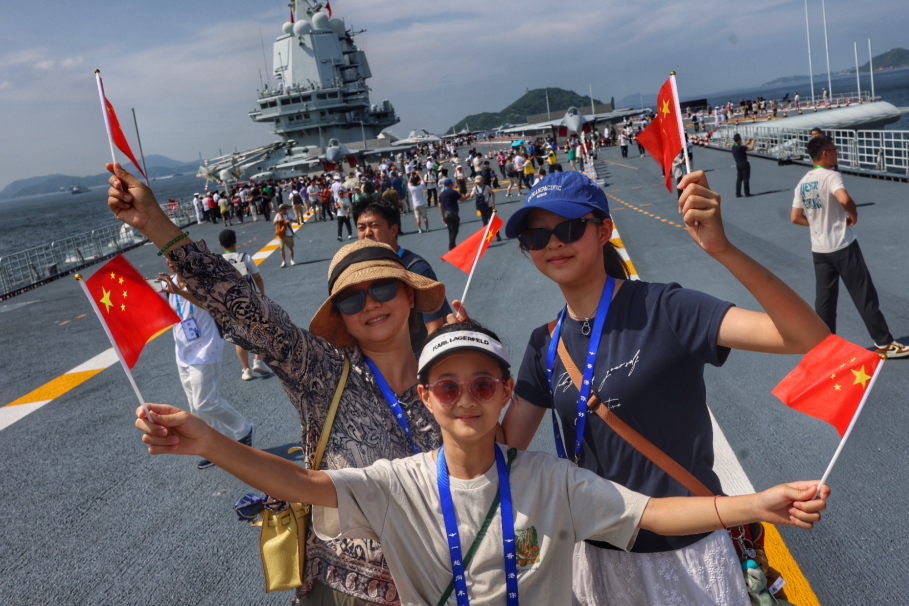Wu: Macao SAR can contribute to telling good stories of China

Editor's note: This year commemorates the 25th anniversary of Macao's return to the motherland. China Daily asks prominent figures in the special administrative region for their reflections on this significant milestone and listens to their visions for the city's continuing prosperity. Wu Zhiliang, president of the Board of Directors of the Macao Foundation, says that the Macao SAR's cultural development can contribute to the endeavor of sharing China's positive narratives.

1. How do you view Macao's development since its return to the motherland? Among the achievements made by Macao, what impressed you the most? In your sector, has there been any major progress over the past 25 years?
Over the past 25 years, there has been significant progress in Macao's development. If we look at it from a historical perspective, the Macao Special Administrative Region is indeed in its best period of development now. Macao's economy has become more integrated with the world, and her social structure has become increasingly diversified as a result. In terms of economic development, as its status as a world-class tourism and leisure center has become increasingly reinforced, Macao's economy has become increasingly resilient. The improved economic prospects have also made the Macao SAR government more capable of improving people's livelihoods, and as a result, improving their quality of life.
Meanwhile, the city's community spirit and of helping one another out remains the same, not to mention the desire of residents to carry out the spirit of patriotism. It is with patriotism as the guiding focus that the people of Macao have created an economic miracle and have united as one to overcome occasional adversities such as SARS, calamities caused by typhoons Hato and Mangkhut, charges instigated by external forces and the recent COVID-19 pandemic.
2. The central government has rolled out an array of policy initiatives for Macao. Does any particular policy benefit your sector? If so, how?
The central government has indeed rolled out many policy initiatives that help further develop the potential of Macao. In terms of culture, for example, it is with the full support of the central government that the "Historic Centre of Macao" was successfully inscribed as a UNESCO World Heritage Site in 2005. This is an affirmation by the international community of the role of Macao as an exchange platform for promoting dialogue between different civilizations. And since its inscription, the Macao Foundation and the educational and cultural agencies of the government have consistently collaborated with local schools and associations to organize dissemination and research projects surrounding the historic center, which reinforce the connotations of the historic center and all of Macao. The "Macao Story" has also become more complete.
Over the past 25 years, we have also witnessed a shift in cultural work in Macao, from bilateral exchanges between two countries (Portugal and China) to multilateral exchanges between China and a greater variety of countries and civilizations. For example, Macao is now part of UNESCO's Creative City Network of gastronomy, while it is also home to the World Health Organization's Collaborating Centre for Traditional Medicine and a United Nations University Institute. In 2025, we will also be one of the annual East Asia Cities of Culture representing China.
In addition to Macao's established international cultural events, such as the International Music Festival, the Art Festival, the Macao Fringe, the Arts and Cultural Festival between China and Portuguese-speaking Countries, a new pattern is emerging whereby the world can understand China through the Macao SAR, and explore ways to achieve a harmonious co-existence of humankind through experiencing the Macao SAR. And because one of the objectives of the policy initiatives rolled out by the central government is to further develop Macao into a genuine international city, Macao's cultural development can further elevate its international status and eventually help establish it as a city with international status.
3. This year marks the third anniversary of the establishment of the Guangdong-Macao In-Depth Cooperation Zone in Hengqin. In your opinion, how should Macao continue to leverage the Hengqin zone's advantages to further develop itself and your sector?
The In-Depth Cooperation Zone in Hengqin provides a hinterland for Macao to expand its economic and social development. Over the past three years we have witnessed increasing connections between the two territories, especially through the Macao New Neighbourhood new residential project, where living conditions with an ambience similar to that in Macao are being created. Social services and education provided by grassroot associations in Macao have also been extended to Hengqin, not to mention public services like the Health Centre (a government clinic) and a 24-hour one-stop government service center.
There are now about 6,500 Macao businesses settled in the In-Depth Cooperation Zone, which comprises about 11 percent of all businesses in operation in the Zone. A business incubation base has been set up by the University of Saint Joseph in Macao, in collaboration with Zhuhai enterprises. The University of Macau is about to build new campuses in the zone soon, and other Macao higher education institutions will follow suit.
The cultural sector is also setting foot in the zone, seeing it as an ideal springboard to promote exchanges and dialogue between different cultures and art forms. The cultural sector can surely take advantage of the zone to promote exchanges between the cities in the Guangdong-Hong Kong-Macao Greater Bay Area, and also between the Greater Bay Area and the outside world, especially through the world-class infrastructures recently inaugurated within the zone.
4. The Guangdong-Hong Kong-Macao Greater Bay Area has seen many notable developments over the past few years. How has Macao's integration with other parts of the GBA impacted your career? What kind of collaboration in the GBA you are anticipating?
One of Macao's positions in the GBA, as detailed in the Outline Development Plan, relates to culture and tourism — that is, to develop into a world-class tourism and leisure center, as well as a base for exchange and cooperation where Chinese culture is the mainstream and diverse cultures coexist. Since one of the basic principles of the GBA development is innovation and reform, we should also bear this in mind when we are building a "Cultural Bay Area", as described in the Outline Development Plan.
Combining the respective strengths of Guangdong as the pioneer of the nation's reform and opening-up, and Hong Kong and Macao as free and open economies, the GBA cities are fully capable of shaping common cultural values when joining forces to promote a vibrant development of culture. We should also create conditions to promote exchanges and mutual learning among different cultures and civilizations, with Hong Kong and Macao as the bases. The two cities share development targets in common, while there are also distinctions. Both cities can have a positive impact on improving hospitality levels and the quality of GBA cities in the Chinese mainland.
To reinforce and realize these development goals, it is impossible for Macao to monopolize cultural and arts development in the GBA context. We should instead promote a "Cultural Bay Area" to blossom everywhere, and promote more interaction and mutually complementary exchanges between the cities. Of course, Macao needs support from other GBA cities, but Macao also has a duty to support them, too. Take literature as an example. If we find commonalities between the local literary creations of different cities, we may expand our space for dialogue and connect different literary creations to make an organic component in building up a common cultural identity within the GBA. And of course, this is just one example. There are lots of other aspects in which we can collaborate, such as cultural heritage protection, performing arts, plastic arts, etc.
5. Macao is a unique blend of Chinese and Portuguese cultures. How do you think this fusion can help the nation enhance communication with the international community and tell good stories of China?
Different ethnicities, cultures, religions and faiths have co-existed and co-prospered in Macao throughout her history, thereby forming her unique features as a place where China meets the West, where the past meets the present, and where there are not only differences but also commonalities. Chinese wisdom calls for inclusion and tolerance of differences while always seeking commonalities. The historical experience of Macao has enriched the connotations and external influence of the Chinese culture. It has built a bridge in academic and technological exchanges. It is an example of exchanges and mutual learning among different civilizations. Such cultural symbolism is so easily identified, and the Macao SAR has formed its own system of discourse in telling the stories of China in languages that other civilizations are able to understand.
6. Many of the city's young people were born after the city's return to the motherland. How do you think this anniversary resonates with the young generation? What messages would you like to convey to them on this historic occasion?
Compared with their parents, Macao's emerging generation clearly has more opportunities to develop themselves, provided they follow the correct path. To the younger ones and those who are not so old, I would say: I hope you can maintain the enthusiasm and spirit of exploration in history and culture throughout your daily lives. Attaining knowledge through small details always brings surprising results.
7. What accomplishments do you hope Macao to achieve in the next 25 years?
As Macao's integration into the national development deepens, there will be more, newer and better changes, and the ability of Macao residents to live a better life will become closer to reality. For this reason I am optimistic about Macao's future.
- Study tour bolsters Sino-Vietnamese youth exchanges
- China builds barrier against desert expansion
- Guizhou dismantles most small hydropower stations to help aquatic ecosystem's health
- Meeting in Wuxi to shape future of Asia-Pacific aquaculture
- Reassessing main Eastern battlefield's role vital to safeguarding peace today
- China, Myanmar, Thailand hold ministerial-level meeting on telecom and cyberspace






































